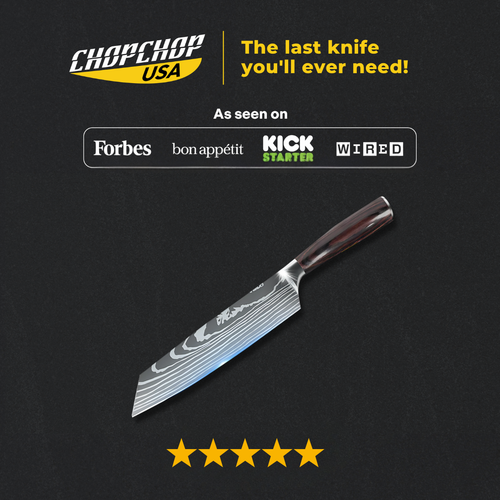Can You Use a Titanium Cutting Board for Cutting Frozen Food? No, you should not use a titanium cutting board for cutting frozen food. While titanium boards are extremely durable and stable, cutting frozen items directly can damage your knife, risk injury, and reduce the lifespan of both your tools and board.
In this guide, ChopChop USA will explain why titanium boards are durable, why cutting frozen food is risky, and how to handle frozen ingredients safely, while answering common questions like can you use a titanium cutting board for cutting frozen food without damaging your kitchen tools.
Why Titanium Cutting Boards Are Durable

Titanium cutting boards are highly valued for their strength, stability, and longevity. Unlike wood or plastic, titanium provides a reliable cutting surface that performs consistently for daily kitchen use, which is why many cooks ask can you use a titanium cutting board for cutting frozen food for heavy-duty tasks.
Strong and Stable Material
Titanium is renowned for its strength-to-weight ratio, making it resistant to bending or warping. Even with frequent chopping, slicing, or dicing, a titanium cutting board maintains a flat and stable surface.
This ensures precision and safety while prepping ingredients. Understanding can you use a titanium cutting board for cutting frozen food safely helps protect both your knife and your board.
Read more: Do Titanium Cutting Boards Slide Around?
Lightweight Yet Reliable
Despite their durability, titanium boards are surprisingly lightweight, making them easy to move, clean, and store. They combine the sturdiness of a professional-grade board with the portability required for home kitchens, offering the best of both worlds. This is especially relevant when considering can you use a titanium cutting board for cutting frozen food in a safe way.
See more: How Thick Are Titanium Cutting Boards?
Maintains Performance Over Time
While no cutting board is completely impervious to scratches, titanium boards retain their stability and integrity even after repeated use. Their smooth surface allows for easy cleaning and minimizes risk of damage affecting performance.
Read more:
- Do Titanium Cutting Boards Show Knife Marks Over Time?
- Can I use Harsh Cleaners on A Titanium Cutting Board?
Hygienic and Long-Lasting
The non-porous surface of titanium keeps your board clean and safe for food preparation. It doesn’t retain odors or bacteria, ensuring a fresh and sanitary cutting surface with minimal upkeep. Knowing can you use a titanium cutting board for cutting frozen food safely will prevent both contamination and accidents.
In summary, titanium cutting boards are durable because of their strength, stability, lightweight design, and hygienic properties. These qualities make them a reliable choice for home cooks and professional chefs who need a cutting board that performs consistently and lasts for years.
Read more:
- Are Titanium Cutting Boards Resistant to Bacteria?
- How to Clean a Titanium Cutting Board: A Step-by-Step Guide
Can You Use a Titanium Cutting Board for Cutting Frozen Food?

No, you should not use a titanium cutting board for cutting frozen food. Frozen items are extremely hard and require significant force to cut. Attempting to cut frozen meat, fish, or vegetables can cause your knife to slip, increasing the risk of serious injury.
Risk to Your Knife
Frozen food can dull or chip your knife faster than normal. Applying excessive force to a hard surface can damage even high-quality blades.
Risk of Injury
Because frozen food is so hard, cutting directly on a titanium board increases the chance of accidental slips. Even with a non-slip mat, frozen items are unforgiving and can lead to cuts or injuries.
Risk to the Board
While titanium boards are highly durable, repeated attempts to cut frozen food can create stress points on the surface over time, potentially affecting stability and lifespan.
How to Cut Frozen Food Safely

Cutting frozen food can be challenging and risky if not done properly. Frozen meat, vegetables, or fish are much harder than fresh ingredients, and trying to chop them without preparation can damage your knife, cause injury, or even affect your cutting board. Follow these tips to ensure safe and efficient handling.
Defrost Frozen Food Before Cutting
The safest approach is to fully or partially thaw frozen items before slicing. You can thaw in the refrigerator overnight, under cold running water, or using a microwave’s defrost setting. Partially defrosted food is easier to manage and reduces the risk of the knife slipping, making your prep safer and more controlled.
Use a Sharp, Sturdy Knife
Choose a heavy-duty, sharp knife designed for dense ingredients. Thin or dull blades are more likely to bend, chip, or slip when cutting frozen items. For the best results, consider using the ChopChop USA Japanese Kiritsuke Knife or the ChopChop USA Stainless Steel Kitchen Knife. These knives are crafted for precision and durability, providing better control and smoother cuts, especially once frozen food has softened slightly.
Stabilize Your Cutting Board with a Non-Slip Surface
Always place your cutting board on a non-slip surface, such as an Anti-Slip Silicone Mat, to prevent shifting while cutting. Even partially thawed items can be tough to handle, so a stable board ensures safety and prevents accidents in the kitchen.
Cut in Smaller Portions with Controlled Pressure
Avoid trying to slice a large frozen block in one go. Cut it into smaller, manageable pieces after some defrosting. Use gentle, steady pressure rather than forcing the knife, allowing the sharp edge to do the work. This protects both your knife and your cutting board while keeping you safe.
By following these steps—defrosting, using the right knife, stabilizing your board, and cutting carefully—you can safely handle frozen ingredients without compromising your tools or risking injury.
ChopChop USA Recommendations
While titanium cutting boards are not recommended for cutting frozen food, they are excellent for fresh or thawed ingredients. Pairing them with high-quality knives ensures maximum control and safety in the kitchen. Here’s a closer look at some of their top products.
ChopChop USA Titanium Cutting Board

The ChopChop USA Titanium Cutting Board is highly-rated as one of the Best Titanium Cutting Boards For in the market. It is perfect for everyday home use. Lightweight yet stable, it provides a reliable surface for slicing, dicing, and chopping fresh or defrosted ingredients. Its compact size is ideal for smaller kitchens, and the titanium construction ensures long-lasting durability and easy maintenance. This board is designed to stay steady during prep work, making it a reliable choice for any home cook who values safety and efficiency.
Key Features:
- Lightweight titanium material for easy handling
- Flat, stable surface for precise cutting
- Compact design ideal for limited counter space
- Hygienic and easy-to-clean surface
- Compatible with non-slip mats for added stability
ChopChop USA Double-Sided Titanium Cutting Board

For those who need versatility and extra workspace, the ChopChop USA Double-Sided Titanium Cutting Board offers two usable surfaces, effectively increasing functional thickness without adding bulk. It’s perfect for meal prep, providing ample room to separate ingredients or rotate sides during use. Non-slip silicone feet ensure stability on most countertops, giving you confidence while chopping or slicing heavier ingredients. This product is also rated as one of the best cutting boards in 2025.
Key Features:
- Two functional sides for extended lifespan and versatile use
- Lightweight yet sturdy titanium construction
- Non-slip silicone feet for enhanced safety
- Extra cutting space for professional or home chefs
- Ideal for heavy meal prep and multitasking
Conclusion
Can You Use a Titanium Cutting Board for Cutting Frozen Food? No, it is not recommended. Even though these boards are durable and stable, frozen items increase the risk of knife damage, injury, and stress on the board.
Defrost your food first, use sharp knives, and consider an Anti-Slip Silicone Mat to maintain safety and performance. ChopChop USA Titanium Cutting Board and Double-Sided Titanium Cutting Board are ideal for fresh and thawed ingredients, combining strength, stability, and hygiene for efficient meal prep.
For more amazing recipes, follow us on Facebook and Instagram! If you have any questions about ChopChop USA's products or promotions, please feel free to contact us at support@chopchopusa.com. Our dedicated team is available 24/7 and always happy to assist you.
Frequently Asked Questions
1. Can titanium boards handle partially frozen food?
It’s safer to fully thaw food; partially frozen items still risk knife slips.
2. Will cutting frozen food damage my knife?
Yes, frozen items can dull or chip blades quickly.
3. Can I use a non-slip mat to cut frozen food safely?
It helps stability but doesn’t eliminate the risk of injury; defrosting is essential.
4. Are ChopChop USA boards durable enough for hard foods?
Yes, for fresh and thawed food—but frozen items should be avoided.
5. What’s the safest way to prepare frozen meat or vegetables?
Fully defrost first, slice into manageable portions, and use a sharp knife on a secure surface.




